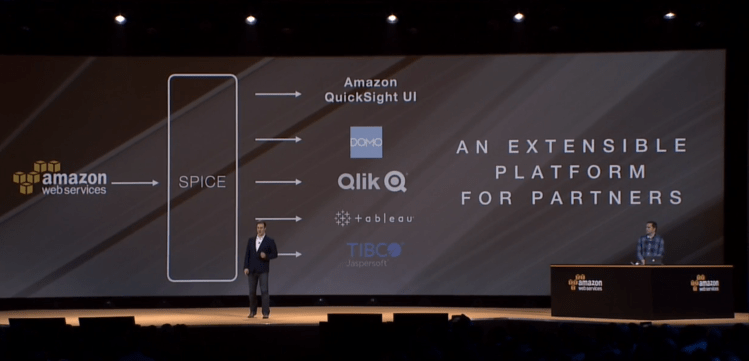Public cloud provider Amazon Web Services (AWS) today launched a new cloud-based business-intelligence (BI) tool, QuickSight. It’s a threat to privately held cloud BI providers like Birst, Domo, GoodData, and BIME, as well as more traditional BI software that can be run in companies’ on-premises data centers, too.
The sting will be particularly harsh for BI vendors that run their websites on top of Amazon, including Birst, Domo, Looker, and Tibco. The first two were specifically called out during the presentation on QuickSight at AWS’ re:Invent conference in Las Vegas this morning. Birst and Domo — as well as Qlik and Tableau — can make use of QuickSight’s SPICE engine when running queries, said AWS chief Andy Jassy.
This might sound like a most unfortunate situation for the startups to be in. And it is. But it’s happened to several other companies before.
Heck, Amazon even did this to a company through another one of its announcements this morning. Amazon launched the Inspector security service even though cloud security startup Dome9 is an AWS customer.
June 5th: The AI Audit in NYC
Join us next week in NYC to engage with top executive leaders, delving into strategies for auditing AI models to ensure fairness, optimal performance, and ethical compliance across diverse organizations. Secure your attendance for this exclusive invite-only event.
Here’s an (admittedly incomplete) list of other AWS services and the AWS customers they compete with:
- Amazon Machine Learning (BigML)
- CodePipeline (CircleCI, Codeship, Shippable)
- Cognito (Facebook’s Parse, Kinvey)
- Elasticsearch Service (Elastic)
- Lambda (Iron.io)
- Simple Notification Service, or SNS (Urban Airship)
- Zocalo (Dropbox)
For these companies and others, it’s critical to provide something different from whatever AWS offers.
Sometimes being ahead of Amazon on just a few features is enough.
It helps to work across multiple clouds, too. That’s the case at Iron.io, part of which runs on Amazon. The startup’s tools can run on multiple public clouds or in on-premises infrastructure.
“That better matches the needs of enterprises that don’t want to be locked into one provider or need hybrid or on-premises for corporate protocol or security reasons,” Iron.io cofounder and chief executive Travis Reeder told VentureBeat in an email.

